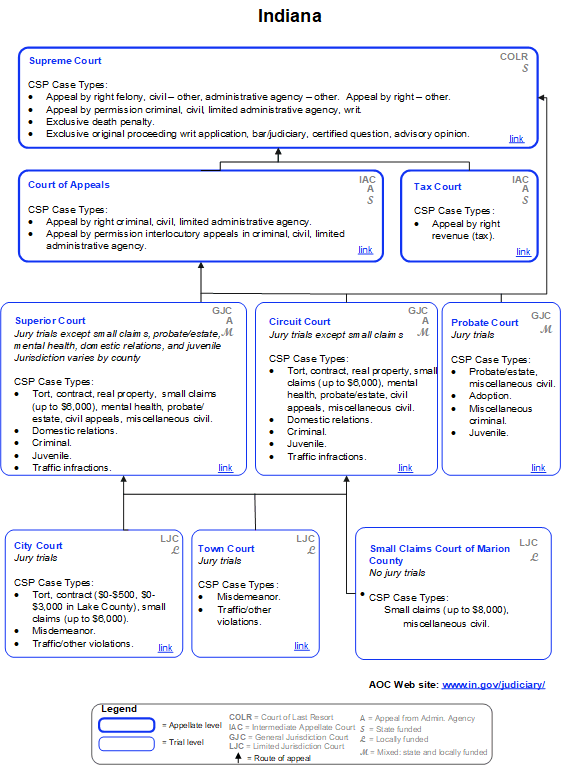

For more information, see the Indiana Court Structure Chart
http://www.in.gov/judiciary/appeals/
The Indiana Court of Appeals consists of 25 judges, serving in five three-judge districts
"As the second-highest court in Indiana, the Court of Appeals hears appeals from the state’s trial courts. The Court does not preside over trials and must accept all appeals sent to it, with the exception of:
https://www.in.gov/courts/directory/
There are currently 315 judges in the Circuit and Superior Courts. These courts are courts of general jurisdiction.
*All quotations on this research guide come from the resource's or agency's website, unless otherwise indicated.

http://www.in.gov/judiciary/supreme/
The Indiana Supreme Court consists of 5 justices. It is the highest court in Indiana and is the court of last resort for the state. It has original jurisdiction in the following areas:
"The Supreme Court also directly reviews appeals involving judgements imposing a sentence of death or life imprisonment without the possibility of parole, appeals from the denial of post-conviction relieve in which the sentence is death, appeals involving waiver of parental consent to abortion, appeals in which a state or federal statute has been declared unconstitutional, and appeals involving orders issued by lower courts mandating funds." (Here is Your Indiana Government, 2009-2010 Edition, p.179).
http://www.in.gov/judiciary/tax/
The Indiana Tax Court consists of one judge.
"The Tax Court has exclusive jurisdiction over any case that arises under the Indiana tax laws and that is an initial appeal of a final determination made by the Indiana Department of State Revenue or the Indiana Board of Tax Review. In addition, the Tax Court has jurisdiction over certain appeals from the Department of Local Government Finance. The Tax Court also hears appeals of inheritance tax determinations from the courts of probate jurisdiction. Such cases are called original tax appeals." - Tax Court website
"The Indiana Office of Court Services (IOCS) was established by the Supreme Court in 2016 as part of an administrative reorganization of state-level judicial branch offices. The IOCS was created to carry out the statutory responsibilities of the Indiana Judicial Center, the Division of State Court Administration, and the Interstate Compact.."
(The Indiana Office of Court Services website)